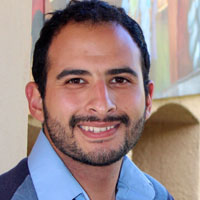Student Profile: Jesus Madrid

Undergraduate: BS, Columbia University
Home Program: Neurosciences
Thesis Lab: Dr. Karen Parker
Please describe your research area and interest.
I’m interested in understanding how our early life social environment is able to influence our brain development. At birth, most mammals heavily depend on a parental figure for survival and it’s been long recognized that the type of care provided and bonds formed early in life have a profound impact on development. However in recent years we’ve been able to begin to understand the genetic and molecular mechanisms through which this early experience fundamentally alters offspring behavior.
What is your dream job/long-term career goals?
Being indebted to the intensive mentoring and support I’ve received that have encouraged me to pursue research, I find the academic trajectory very appealing. As an investigator, not only would I be able to broaden the limits of our new scientific knowledge, but as a professor I would also be responsible for both the dissemination of the knowledge and in training the new generation of scientists.
Why did you decide to attend Stanford?
Stanford University understands that graduate students are individuals with interests that span outside of research. As such, the university does a great job at giving us opportunities to pursue our interests outside of the laboratory. I like to think that Stanford’s unofficial motto is “happy graduate students are productive graduate students”.
Who are your sources of support at Stanford?
I have a tremendously supportive network that starts with my lab members and principle investigator. The neuroscience community here at Stanford is also equally supportive of its students and tries hard to foster close relationships between the students and the faculty.
How do you bring diversity to Stanford Biosciences?
I bring to Stanford University my own particular life experiences as a first-generation/low income, latino, LGBT student. I believe that my own intersection of identities has made me very keenly aware of the importance of an inclusive environment for social responsibility and also a source of creativity and new perspectives in research.
What activities are you involved in outside of research?
I sing in chamber choir at Stanford University. I am also a dedicated member of initiatives that promote mentorship and social advocacy such as the First-gen/Low Income mentorship program, frosh scholars program for Stanford freshmen. I’ve had the privilege of leveraging my mentoring outreach by being a graduate scholar resident at Stanford’s El Centro Chicano y Latino. As vice president of the Biomedical Association for the Interest of Minority Students (BioAIMS) I’ve been able to jump start initiatives to give students in the medical campus opportunities to talk about identity and privilege. Finally I have also been able to teach courses via Stanford’s Splash program and abroad in Mexico.
What do you like best about graduate school at Stanford?
The supportive environment, the great access to the outdoors, the boundless opportunities I am fortunate to have at my fingertips every single day.
